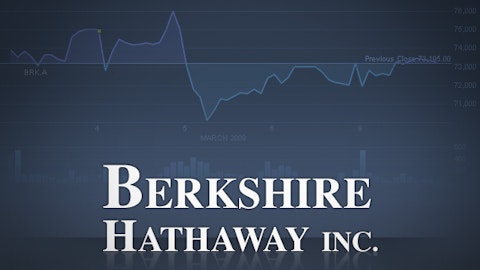
The Berkshire Hathaway Inc. (NYSE:BRK.A) annual meeting is attended by throngs of Berkshire faithful. For some shareholders at the meeting, it’s probably impossible for Berkshire Hathaway Inc. (NYSE:BRK.A) CEO Warren Buffett to ever be wrong in their eyes. If we’re being realistic, though, Buffett does indeed have his slip-ups. As partner-in-crime Charlie Munger put it:
“Just because Warren thought something years ago doesn’t make it a law of nature.”
With that in mind, I rounded up the team of Fools who attended this year’s Berkshire Hathaway Inc. (NYSE:BRK.A) meeting to ask in what ways Buffett disappointed them during the meeting.
Brendan Mathews: Toward the end of the meeting, a shareholder asked about International Business Machines Corp. (NYSE:IBM)‘s moat. Warren basically sidestepped the question, saying he didn’t understand IBM’s moat as well as The Coca-Cola Company (NYSE:KO)‘s. According to Buffett, He likes IBM’s financial policies and thinks it will do well, but he feels more conviction in Coca-Cola, Wrigley, H.J. Heinz Company (NYSE:HNZ), and Burlington Northern Santa Fe.
Considering the size of Berkshire Hathaway Inc. (NYSE:BRK.A)’s investment in IBM, I hoped for a better answer. I wish he had directly addressed the question, and said something like this:
IBM is a technology business, but it is somewhat unique among technology companies. It has strong streams of recurring revenue from service and software contracts that can extend up to a decade. It has very strong relationships with clients, and it is, by nature of the business, very hard to switch vendors. These switching costs, in addition to IBM’s well-respected brand, gives IBM a unique amount of pricing power, and its earnings are much more reliable and predictable than with the average tech company.
Scott Phillips: There’s something a little strange about deigning to criticize the world’s greatest investor. He has more than 50 billion reasons (each of them a U.S. dollar) to suggest he’s probably got more right than wrong!
The man nominated to be the Berkshire “bear,” Doug Kass, attempted to make a bet with Buffett and Munger, effectively asking for $100 million of Berkshire Hathaway Inc. (NYSE:BRK.A)’s money, with which to prove he could beat the market by acting as a short-seller — with Kass’ fees going to charity in their entirety if he lost the bet. Before Buffett could answer, Munger gave a succinct “no.”
I don’t blame Berkshire Hathaway Inc. (NYSE:BRK.A) for turning Kass down, but I wish they’d thought to go one further — to choose a time frame that was long enough to bear out the results, and have a friendly bet on the performance of the market against the return from Kass’ fund. That would have put Kass well and truly on the spot, and I’ll bet Buffett would have won.
Michael Olsen, CFA: When asked about ISCAR’s competitive advantage, Buffett gave an uncharacteristically droning, almost evasive reply:
ISCAR has incredible competitive advantages. If you go back to 1951 in Israel, just go back to the prospects that were facing him (well-financed, entrenched competition). Most machine-cutting tools companies sell to heavy industry using materials shipped from China. A young man, at 25, creates ISCAR, with no locational advantage, and it becomes a great company to today. That’s hard work and talent. ISCAR is one of the great companies of the world, and we feel very proud to be associated with it.
In things Buffett already knows: A good outcome doesn’t mean all is well. Likewise, ISCAR’s success isn’t proof of a competitive advantage in and of itself. Buffett knows that. My best guess is that, in his attempt at distilling things, he boiled it down a bit too much.
Here’s what I think he meant to say, and most assuredly knows:
In a relatively small worldwide market, where a continuous need to source tungsten exists (because blades wear quickly), ISCAR benefits from being one of only two players of scale. Its scale affords a critical supply-chain advantage, and incremental sales (of blades) are immensely profitable. Competitors just can’t get a foothold, because of the cost of building a supply imprint. That, in turn, affords pricing power.
Matt Koppenheffer: I’ll echo what Brendan said about IBM. Given that Buffett has made that company a “big four” holding at Berkshire — joining the company’s massive holdings in Wells Fargo & Co (NYSE:WFC), Coca-Cola, and American Express Company (NYSE:AXP) — I had hoped that he’d have a better answer to the IBM-moat question.
But since Brendan has already covered that, I’ll add that I was also a bit bummed about Buffett’s response to a question about the skills of Berkshire’s insurance guru Ajit Jain. Buffett did a nice, folksy sidestep of the question, opting instead to quip that “if Ajit ever is not with us, we won’t look as good,” and “if he came in at 1965 instead of 1985, we’d probably own the world.” Charming, but not terribly helpful in understanding what has made Jain so successful running one of Berkshire’s key businesses.
The closest Buffett came to actually answering the question was this: “When people copy [Ajit], he comes up with something new.” So we can at least take away that small tidbit — that Jain is intellectually flexible and creative enough to find new avenues when his current ones get crowded.
The article Here’s How Warren Buffett Disappointed Me originally appeared on Fool.com.
Matt Koppenheffer owns shares of Berkshire Hathaway. The Motley Fool recommends American Express, Berkshire Hathaway, Coca-Cola, H.J. Heinz, and Wells Fargo and owns shares of Berkshire Hathaway, International Business Machines (NYSE:IBM)., and Wells Fargo.
Copyright © 1995 – 2013 The Motley Fool, LLC. All rights reserved. The Motley Fool has a disclosure policy.



